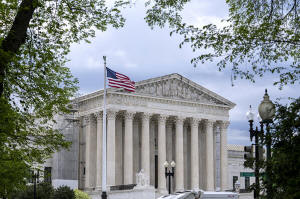Supreme Court makes it easier to claim 'reverse discrimination' in
employment, in a case from Ohio
[June 06, 2025]
By MARK SHERMAN
WASHINGTON (AP) — A unanimous Supreme Court made it easier Thursday to
bring lawsuits over so-called reverse discrimination, siding with an
Ohio woman who claims she didn’t get a job and then was demoted because
she is straight.
The justices’ decision affects lawsuits in 20 states and the District of
Columbia where, until now, courts had set a higher bar when members of a
majority group, including those who are white and heterosexual, sue for
discrimination under federal law.
Justice Ketanji Brown Jackson wrote for the court that federal civil
rights law draws no distinction between members of majority and minority
groups.
“By establishing the same protections for every ‘individual’ — without
regard to that individual’s membership in a minority or majority group —
Congress left no room for courts to impose special requirements on
majority-group plaintiffs alone,” Jackson wrote.
The court ruled in an appeal from Marlean Ames, who has worked for the
Ohio Department of Youth Services for more than 20 years.
Though he joined Jackson's opinion, Justice Clarence Thomas noted in a
separate opinion that some of the country's “largest and most
prestigious employers have overtly discriminated against those they deem
members of so-called majority groups.”

Thomas, joined by Justice Neil Gorsuch, cited a brief filed by America
First Legal, a conservative group founded by Trump aide Stephen Miller,
to assert that "American employers have long been ‘obsessed’ with
‘diversity, equity, and inclusion’ initiatives and affirmative action
plans."
Two years ago, the court's conservative majority outlawed consideration
of race in university admissions. Since taking office in January,
President Donald Trump has ordered an end to DEI policies in the federal
government and has sought to end government support for DEI programs
elsewhere. Some of the new administration’s anti-DEI initiatives have
been temporarily blocked in federal court.
Federal agencies have moved quickly to implement Trump’s vision and
shift priorities to reflect that mission, including rooting out
discrimination against members of majority groups.
[to top of second column]
|

Supreme Court is seen on Capitol Hill in Washington, April 25, 2024.
(AP Photo/J. Scott Applewhite, File)

The head of the Equal Employment Opportunity Commission, responsible for
enforcing workplace anti-discrimination laws, has pivoted the agency to
focus on eliminating “all forms” of race discrimination, including those
stemming from DEI initiatives.
At the same time, Acting Chair Andrea Lucas has moved to deprioritize
cases involving discrimination against transgender workers, saying she
rejects the idea that “civil rights exist solely to remedy harms against
certain groups.”
Jackson's opinion makes no mention of DEI. Instead, she focused on Ames'
contention that she was passed over for a promotion and then demoted
because she is heterosexual. Both the job she sought and the one she had
held were given to LGBTQ people.
Title VII of the Civil Rights Act of 1964 bars sex discrimination in the
workplace. A trial court and the 6th U.S. Circuit Court of Appeals ruled
against Ames.
The 6th circuit is among the courts that had required an additional
requirement for people like Ames, showing “background circumstances”
that might include that LGBTQ people made the decisions affecting Ames
or statistical evidence of a pattern of discrimination against members
of the majority group.
The appeals court noted that Ames didn’t provide any such circumstances.
But Jackson wrote that “this additional ‘background circumstances’
requirement is not consistent with Title VII’s text or our case law
construing the statute.”
___
Associated Press writer Claire Savage contributed to this report from
Chicago.
All contents © copyright 2025 Associated Press. All rights reserved
 |